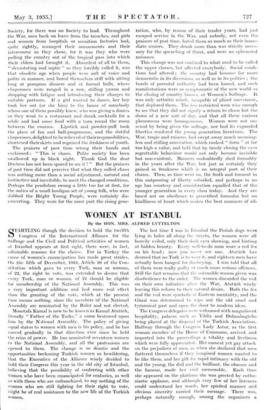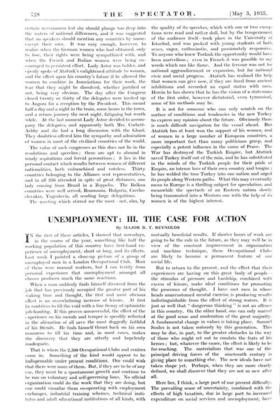WOMEN AT ISTANBUL
By the HON. MRS. ALFRED LYTTELTON
STARTLING though the decision to hold the twelfth Congress of the International Alliance for the Suffrage and the Civil and Political activities of women at Istanbul appears at first sight, there were, in fact, adthirable reasons for the choice. For in Turkey the cause of women's emancipation has made great strides. On the fifth of December, 1934, Article 10 of the Con- stitution which gave to every Turk, man or woman, of '22, the right to, vote, was extended to decree that every o . Turk, man or woman, of 22 should be eligible for membership of the National Assembly. This was a Very important addition and had more real effect than the granting of the vote, which at the present time means nothing, since the members of the National Asseinbly are nominated by the Ruler and not elected.
Moustafa Kamal is now to be knownras Kemal Ataturk, literally "Father of the Turks," a name bestowed upon him by the National Assembly. The policy of giving equal status to women with men is his policy, and he has moved gradually in that direction ever since he held the reins of power. He has nominated seventeen women to the National Assembly, and all the professions are opened to them. The change is so drastic and the opportunities beckoning Turkish women so bewildering, that the Executive of the Alliance wisely decided to hold their Congress this year in the old city of Istanbul, believing that the possibility of conferring with other women who have been emancipated for centuries, as well as with those who are enfranchized, to say nothing of the women who are still fighting for their right to .vote, might be of real assistance to the new life of the Turkish women. The last time I was in Istanbul the Pariah dogs were_ lying in holes all along the streets, the women were all heavily veiled, only their dark eyes showing, and hinting at hidden beauty. Every well-to-do man wore a red fez on his head ; now you never see one. Atatiirk has decreed that no Turk is to wear it, and eighteen men have actually been hanged for disobeying. I was told that all of them were really guilty of much more serious offences. Still the fact remains that the ostensible reason given was disobedience to the order. The women discarded the veil on their own initiative after the War, Atatiirk wisely leaving this reform to their natural desire. Both the fez and the veil were symbolic of Eastern mentality, and the Ghazi was determined to wipe out the old cruel and tyrannical past and open the door to modern ideas.
The Congress delegates were welcomed with magnificent hospitality, palaces such as Yildiz and Dolmabagtche being placed at the disposal of the Turkish Association. Halfway through the Congress Lady Astor, as the first woman member of the House of Commons, arrived, and imported into the proceedings a vitality and liveliness which were fully appreciated. Her earnest yet gay attack on the prejudices of men, as when she declared that men flattered themselves if they imagined women wanted to be like them, and her gift for rapid intimacy with the old and the young, the dull and the brilliant, the obscure and the famous, made her visit memorable. Each time she appeared on the platform she was greeted by enthu- siastic applause, and although very few of her listeners could understand her words, her spirited manner and obvious sincerity carried their message. There was, perhaps naturally enough, among the organizers a certain nervousness lest. she should plunge too Lleep into the waters of national differences, and it was suggested that no speakers should mention any countries by name, except their own. It was easy enough, however, to realize when the German women who had obtained, only to lose, their rights were being sympathized with, and when the French and Italian women were being_ en- c•ouraged to persistent effort. Lady Astor was bolder, and openly spoke of Atatiirk's enlightened attitude to women, and the effect upon his country's future if he allowed the women to combine in Associations for their work, the fear that they might be dissolved, whether justified or not, being very obvious. The day after the Congress dosed twenty or thirty of the delegates were invited up to Angora for a reception by the President. This meant half a day and a night in the train, some hours in the town, and a return journey the next night, fatiguing but worth _while. At the last moment Lady Astor decided to accom- pany the delegates, and apparently both Mrs. Corbett- Ashby and she had a long discussion with the Ghazi. They doubtless offered him the sympathy and admiration of women in most of the civilized countries of the world.
The value of such congresses as this does not lie in the resolutions and speeches ; these are apt to abound in windy aspirations and fervid perorations ; it lies in the personal contact which results between women of different nationalities, both enfranchised and voteless. Thirty countries belonging to the Alliance sent representatives, and in all 256 attended in spite of great distances, one .lady coming from Brazil in a Zeppelin. The Balkan countries were well served, Roumania, Bulgaria, Czecho- slovakia, Yugoslavia, all sending large delegations. The meeting which stirred me the most—not, alas, by the quality of its speeches, which with one or two excep- tions were read and rather dull, but by the temperament of the audience itself—took place in the University of Istanbul, and was packed with young students of both sexes, eager, enthusiastic, and passionately responsive. To anyone who knew Turkish the opportunity would have been marvellous ; even in French it was possible to say words which ran like flame. And the fervour was not for national aggrandizement or expansion, but for national civic and social progress. Atatfirk has realized the help that women can give now, if they are freed from ancient inhibitions and accorded an equal status with men. Herein he has shown that he has the vision of a statesman of the first order, however dictatorial, even tyrannical, some of his methods may be.
. It is not for someone who can only scratch on the surface of conditions and tendencies in the new Turkey to express any opinion about the future. Obviously there is much difficult navigation for the vessel ahead. But Atatiirk has at least won the support of his women, and of women in a large number of European countries, a more important fact than many politicians grasp, and especially a potent influence in the cause of Peace. The War has destroyed the Turkish Empire, but Atatfirk saved Turkey itself out of the ruin, and he has substituted in the minds of the Turkish people for their pride of Empire, an intense love of their own country and tongue ; he has welded the true Turkey into one nation and urged its people along Western paths. What this may eventually mean to Europe is a thrilling subject for speculation, and meanwhile the spectacle of an Eastern nation slowly being transmuted into a Western one with the help of its women is of the highest interest.















































 Previous page
Previous page